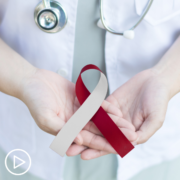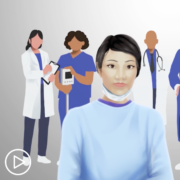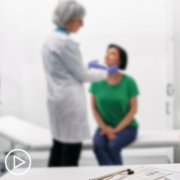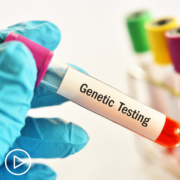Head and Neck Cancer Care | The Benefits of Partnering With Your Healthcare Team
Head and Neck Cancer Care | The Benefits of Partnering With Your Healthcare Team from Patient Empowerment Network on Vimeo.
How can head and neck cancer patients improve their care by partnering with their healthcare team? Expert Dr. Ezra Cohen discusses how patients can more actively engage in their care and treatment decisions, provides educational support resources, and shares key questions to ask providers about care.
Dr. Ezra Cohen is a medical oncologist, head and neck cancer researcher and Chief Medical Officer of Oncology at Tempus Labs.
See More from Evolve Head & Neck Cancer
Related Resources:

Head and Neck Cancer Research | How Innovation Leads to Advances in Care |

Head and Neck Cancer | Key Factors Affecting Treatment Decisions |

|
Transcript:
Katherine:
Why is it so important, then, for patients to engage in their care and their treatment decisions?
Dr. Cohen:
I think it’s critical not only for patients but for their caregivers as well. And really, patients should arm themselves with information. And fortunately, we live in an age where information is more readily available. You don’t have to depend on a single source. Now, granted, that information can be confusing, and sometimes it’s way too confusing. Sometimes that information can even be misleading. So, one does have to be careful.
But, having said that, I think it’s so important for patients to arm themselves with information, different approaches, and what I often tell patients is get a second opinion. With one caveat, that I’ll get to in a second. Because the reason is this is a life-threatening diagnosis for, unfortunately, many patients. And the first approach, our first chance to treat it is our best chance to treat it.
So, you really want to make sure that you’re in a center that you’re comfortable with, preferably one that has experience. A provider that you’re comfortable with, that you feel at ease asking questions, you’re not intimidated and a plan that really makes sense for you and has taken into account what is this individual.
What’s our best approach to this individual? Not to an entire population but what are we going to do for this person sitting in that chair at this time? Now, the caveat for second opinions, especially for patients with locally advanced disease, there is a time factor. And what I mean by that is I have seen patients get multiple opinions and delay the start of therapy, which we now realize impacts our ability to cure the cancer.
And so, I would say it’s fine to get second opinions or even third opinions, but don’t take a lot of time doing it. The earlier therapy starts, the better our chance of curing the caner. So, there is sort of a balance there.
Katherine:
Well, that’s great advice, Dr. Cohen. PEN has also created downloadable office visit planners to help you organize your thoughts and communicate effectively with your healthcare team.
And that’s also in the toolkit I mentioned earlier at powerfulpatients.org. And I think this is a good segue into talking about the importance of self-advocacy. If a patient is feeling that they aren’t getting the best care or they’re uncomfortable with the care they’re getting, what steps should they take to change that?
Dr. Cohen:
Well, I think the first thing is talk to the provider. Just have that conversation. I think we have to realize that oncologists are human, and they’re people, and sometimes they get very busy. Sometimes they don’t pay attention to as much as they should. And sometimes, they don’t even know that there’s a problem. So, I would say the first thing to do is have a frank conversation with your provider. These are my questions. Don’t be afraid to ask questions. Never be afraid to ask questions. These are my expectations.
Can you meet them? And in my experience, not even just personal experience, but working with many oncologists over two decades, most oncologists will say, “Oh, I didn’t realize that this was what you wanted. Let’s make it happen.” So, that I would say is the first thing. Talk to the people that are already taking care of you. If, or whatever reason, that doesn’t work and you’re not comfortable, I would ask that provider, “Is there somebody else that – I would like to change. Is there somebody else that you would recommend?” In the worst-case scenario, that might involve going to a different institution. And the reason I say that’s a worst-case scenario is that especially in the setting of locally advanced disease, interrupting therapy or changing therapy in the middle really would have a dramatic adverse impact on outcome.
So, I would try to avoid that as much as possible. If there are natural points in the care where it makes sense to consider a change, I think that would be a lot less impactful and make more sense. For instance, if somebody is going from having completed a course of chemotherapy radiation, they now have no evidence of disease on their scans, and they want to switch to a center that is closer to home, for instance. That makes sense. And we have certainly many patients that do that and that’s a natural transition. But, to change in the middle of care, that can often have a dramatic negative impact.










